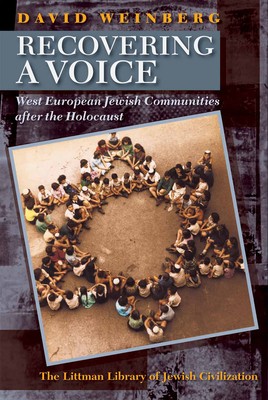
- We will send in 10–14 business days.
- Author: David H Weinberg
- Publisher: Littman Library of Jewish Civilization in Association with Liverpool University Press
- ISBN-10: 1906764107
- ISBN-13: 9781906764104
- Format: 23.4 x 15.8 x 3.8 cm, kieti viršeliai
- Language: English
- SAVE -10% with code: EXTRA
Reviews
Description
This multi-national study focuses on the efforts by the Jews of France, Belgium, and the Netherlands to reconstruct their lives after World War II. These efforts have largely been ignored, perhaps because the emphasis on assisting survivors in displaced persons camps and on developing Israel as the center of Jewish life after the Holocaust diverted attention from the struggle by Jews in Western Europe to recover their voice and sense of purpose. The book sets the record straight, presenting the challenges that the Jews in the three communities faced, both in the national context and in the world Jewish arena, and examining how they dealt with them. The book begins by reviewing the actions taken by international Jewish agencies and local leaders to revive Jewish communities in the three countries materially and institutionally, remodeling them as efficient, self-sustaining, and assertive bodies that could meet new challenges. With the creation of the State of Israel, Jews who
stayed in Western Europe had to defend their decision to do so while nevertheless showing public support for the new nation.There was also a felt need to respond quickly and effectively to any sign of anti-semitism.
countries.Underscoring the similar political, cultural, social, and economic issues facing Jewish survivors, the book demonstrates how - with the aid of international Jewish organizations - France, Belgium, and the Netherlands used unprecedented means to meet unprecedented challenges. It is a story worth telling that adds much to our understanding of post-war European Jewish life.
EXTRA 10 % discount with code: EXTRA
The promotion ends in 21d.23:35:10
The discount code is valid when purchasing from 10 €. Discounts do not stack.
- Author: David H Weinberg
- Publisher: Littman Library of Jewish Civilization in Association with Liverpool University Press
- ISBN-10: 1906764107
- ISBN-13: 9781906764104
- Format: 23.4 x 15.8 x 3.8 cm, kieti viršeliai
- Language: English English
This multi-national study focuses on the efforts by the Jews of France, Belgium, and the Netherlands to reconstruct their lives after World War II. These efforts have largely been ignored, perhaps because the emphasis on assisting survivors in displaced persons camps and on developing Israel as the center of Jewish life after the Holocaust diverted attention from the struggle by Jews in Western Europe to recover their voice and sense of purpose. The book sets the record straight, presenting the challenges that the Jews in the three communities faced, both in the national context and in the world Jewish arena, and examining how they dealt with them. The book begins by reviewing the actions taken by international Jewish agencies and local leaders to revive Jewish communities in the three countries materially and institutionally, remodeling them as efficient, self-sustaining, and assertive bodies that could meet new challenges. With the creation of the State of Israel, Jews who
stayed in Western Europe had to defend their decision to do so while nevertheless showing public support for the new nation.There was also a felt need to respond quickly and effectively to any sign of anti-semitism.
countries.Underscoring the similar political, cultural, social, and economic issues facing Jewish survivors, the book demonstrates how - with the aid of international Jewish organizations - France, Belgium, and the Netherlands used unprecedented means to meet unprecedented challenges. It is a story worth telling that adds much to our understanding of post-war European Jewish life.


Reviews